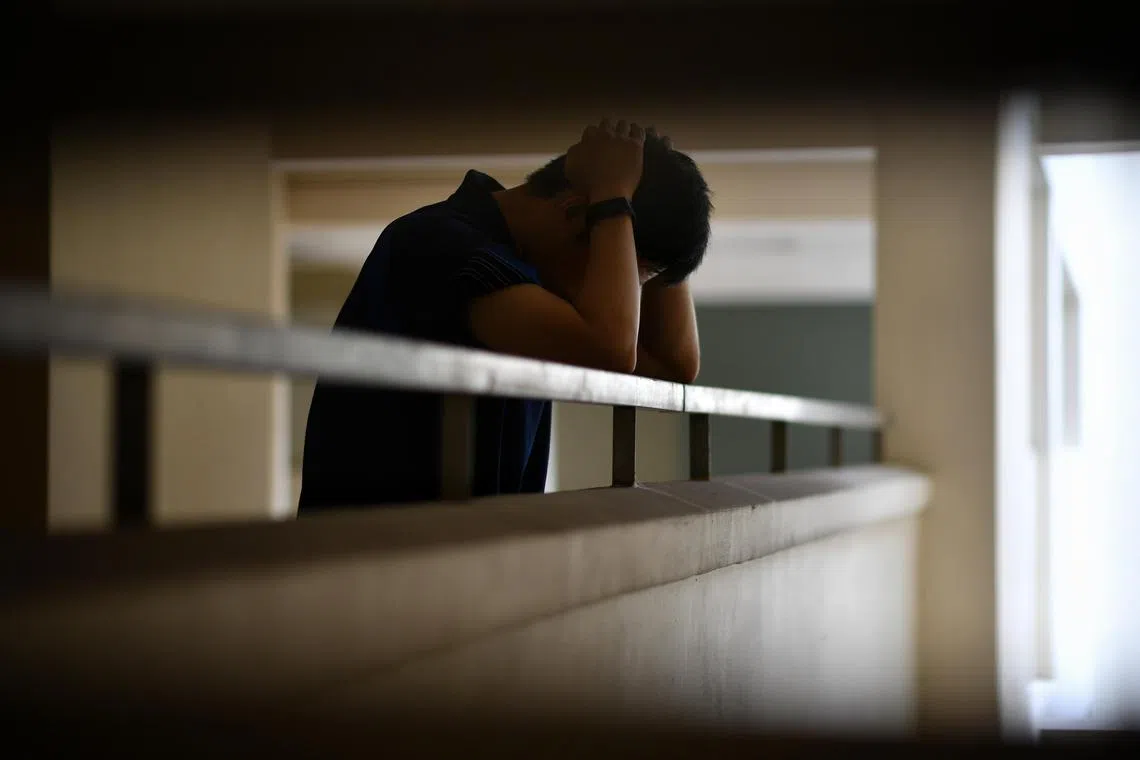Number of suicides in Singapore drops in 2023, lowest since 2000
Sign up now: Get ST's newsletters delivered to your inbox

The Samaritans of Singapore said the largest proportion of deaths by age was among 20- to 29-year-olds. The group made up 17.7 per cent of all suicide deaths in 2023.
PHOTO: ST FILE
SINGAPORE – A total of 322 suicides were reported in Singapore in 2023 – a 32.4 per cent drop from 2022 and the lowest such figure since 2000.
It was also the first time that the number of suicides dropped across every age group, suicide prevention charity Samaritans of Singapore said in a statement on July 12.
Observers and experts say greater mental health support and spotlight on the issue could be contributing factors to the decline.
This comes after 2022’s record high of 476 cases,
Associate Professor Daniel Fung, chief executive of the Institute of Mental Health, said: “There has been substantial work from cross-sectoral agencies, from hospitals to social service agencies, on suicide prevention.”
These include the initiatives under the Inter-agency Research Workgroup for Youth Suicides that have helped to identify at-risk individuals early and provide crisis support.
He added: “Besides the Government’s resources and community programmes, I think it is important that we all play a part to prevent suicide by looking out for one another, and developing mental health literacy, to better support ourselves and those we care about.”
In response to queries from The Straits Times, the Samaritans said it could not pinpoint the drop to any one specific reason as suicide is complex and multifaceted.
Apart from scaling up its own community-based programmes, it said there has been increased mental health awareness via campaigns and several other government and community initiatives.
In September 2023, multiple individuals and organisations, led by advocacy group SG Mental Health Matters, announced that they are developing a national suicide prevention strategy to tackle the worrying issue. The endeavour is named Project Hayat, which means “life” in Malay, and is co-led by former Nominated MP Anthea Ong.
In a separate statement on July 12, SG Mental Health Matters said the project will start public consultations on July 19 to let people share their concerns about, and experiences with, suicide. Singaporeans and permanent residents above the age of 21 can share their views at this website
The public consultations will be conducted for three months by the NUS Saw Swee Hock School of Public Health, the National University of Singapore and OPPi, a citizen engagement platform. The advocacy group hopes to get at least 2,000 respondents.
Ms Ong said the significant decline in cases is surprising but encouraging, given what is seen and heard from community and mental health professionals on the ground. But she said the taboo on discussing suicides, though still apparent in some spaces, has lessened due to the Covid-19 pandemic.
Ms Rosie Ching, principal lecturer in statistics at Singapore Management University, similarly said the drop is a heartening surprise, especially after 2022’s high number of cases.
“I hope that this will move on a downward trend and not be a one-off result. But this is indeed a light in the dark web of suicide.”
She said that in 2022, a high figure of more than three in four, or about 77 per cent, rated their level of knowledge about suicide as lower than average. The result is from a study she led on attitudes towards suicide in 2022 that surveyed close to 3,000 people in Singapore.
“This has now reversed to more than 50 per cent saying they have at least average knowledge about suicide, marking a significant improvement in suicide awareness, although we still have a long way to go, with the average knowledge level at an overall lower than average,” she said, citing findings from the 2024 iteration of her study that surveyed nearly 5,300 people here.
Ms Ong said more spaces have opened up to enable conversations on self-harm and suicide that would have created more awareness and help-seeking, adding that such community efforts in suicide prevention have contributed to the fall in the number of suicides.
“If this significant drop in 2023 is indeed a turning point in our suicide rates, then it’s a tribute to the many community workers, counsellors, mental health professionals and advocates who have been working tirelessly for many years on suicide prevention.”
The Samaritans said the largest proportion of deaths by age was among 20- to 29-year-olds. The group made up 17.7 per cent of all suicide deaths in 2023.
Suicide was the leading cause of death for young people aged between 10 and 29 for the fifth consecutive year, despite a 31.2 per cent drop in numbers from 2022.
The Samaritans said that timely support, through building strong connected families and communities, can help to mitigate the risk of suicide among young people.
In 2023, the organisation launched a programme targeted at young people aged 13 and above. The initiative, known as Mindful Bytes, aims to teach young people how to engage in safe online conversations to support those who show signs of suicide risk, and learn appropriate words to use when talking about suicide.
Even though the numbers have dropped, the Samaritans said there is still more to be done. “A more intentional effort is needed to ensure that each individual becomes a first responder, empowering everyone to look out for one another.”
It added: “By equipping individuals with the knowledge and skills to recognise and respond to signs of distress, we can create a community where everyone plays a role in preventing suicide.”
Ms Ong said: “We must not focus on the significant drop as a ‘success’ and forget that this drop, if indeed reflective of the ground reality, merely means we are on the right track and therefore more should be done so we can work towards a zero-suicide society.”
Dr Jared Ng, the medical director for Connections MindHealth, said: “While it’s encouraging to see a decline in suicide numbers, we must remember that one suicide is one too many. Each loss sends ripples through families, schools, workplaces and entire communities... We cannot be complacent; we must continue to be vigilant towards those around us, empathise with those in need and practise kindness to ourselves and others.”
Helplines
Mental well-being
Institute of Mental Health’s Mental Health Helpline: 6389-2222 (24 hours)
Samaritans of Singapore: 1-767 (24 hours) / 9151-1767 (24 hours CareText via WhatsApp)
Singapore Association for Mental Health: 1800-283-7019
Silver Ribbon Singapore: 6386-1928
Tinkle Friend: 1800-274-4788
Chat, Centre of Excellence for Youth Mental Health: 6493-6500/1
Women’s Helpline (Aware): 1800-777-5555 (weekdays, 10am to 6pm)
Counselling
Touchline (Counselling): 1800-377-2252
Touch Care Line (for caregivers): 6804-6555
Care Corner Counselling Centre: 6353-1180
Counselling and Care Centre: 6536-6366
We Care Community Services: 3165-8017
Online resources
carey.carecorner.org.sg
(for those aged 13 to 25)limitless.sg/talk
(for those aged 12 to 25)



